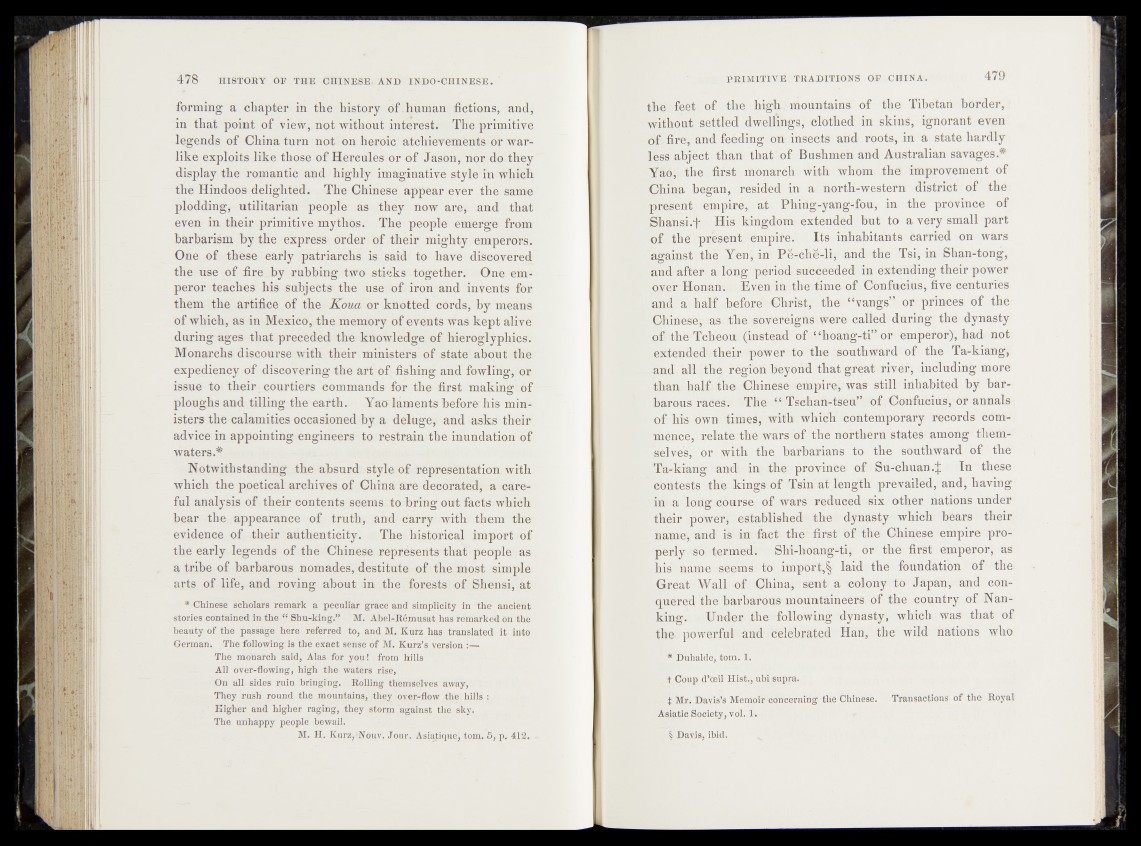
forming a chapter in the history Of .human fictions, and,
in that point of view, not without interest. Tbre primitive
legends of China turh>»not on heroic atchievementSor warlike
exploits like those of Hercdles^or of Jasbh, nor do they
display the romantic and highly imaginative style in which
the Hindoos;delighted. The Chinesë appear ever the same
plodding, -utilitarian pèôple as they now are,, and that
even- in their primitive mythos. The people emerge from
barbarism by the express order of their mighty emperors.
One of these early patriarchs is- said to have discovered
the use of firo.by rubbing two sticks together. One emperor
teaches his subjects the use of iron and invents for
them the artifice of the Koua or knotted cords, by means
of which, as in Mexico, the memory of events was kep%alive
during ages that preceded the knowledge of hieroglyplj||St
Monarchs discourse with their ministers of state, about: the
expediency of discovering tire art of fishing and fowling,-o^
issue to; their courtiers commands for j&è first making of
ploughs and tilling the earth. Yaolaments beforeshis ministers
the calamities occasioned by a deluge,- and -asks their
advice in appointing engineers to restrain the inundation of
waters.*
Notwithstanding the absurd 'Style of-representation with
which the poetical archives of China" are decorated, a .careful
analysis of-their contents seemsiio bring out facts which
hear the appearance of truth,.;and carry with .them the
evidence of their authenticity. The historical import of
the early legends of the Chinese represents that pêoplesas.
a tribe of barbarous nomades, destitute of the most simple
arts of life, and roving about in the forests of Shensi, at
* Chinese scholars remark a peculiar grace and simplicity in -the ancient
stories contained in the “ Sbu-king.” M. Abel-Rémusat has remarked bn the
beauty of the passage here referred to, and M. Kurz has translated it into
German. The following is the exact sense bf M. Kurd’s version :—
The monafch said, Alas for you! from hills .
All over-flowing, high the waters rise,
On alt-sides ruin bringing. Rolling themselves Away,
They rush round the mountains, they over-flow the hills :
<" Higher and higher raging, they storm against the sky.
The unhappy people bewail.
M. H. Kurz/Nouv. Jour. AsiatKpefjtom. 5, p. 412. .
thS^ &Ngjpf thé „high. riiountainö of the Tibetan border, }
wi^hioutfe^l^ dwellings,' clothed in. skins, ignorant even
of, fire; "andf;f%&d.m^f)h!j insects and. roots, in a state hardly
leis^lljhc^ than thatfof Bushmen ind Australian savages.*
Yaö, the fifst mbnarckHwith whom the improvement of
Jihina/began, resided p^a^north-western district of the
jjppse i f empire, at- Phikg-yang^fou,, in,--' the province of
Shansi.il* His kii^(|^pfexten;d^d "but to a very small part
of the present empireCt i Its inhabitants carried on wars
'against-:the* Yen, in iP/e^ëhë-li-j and thp Tsi; in Shan-tong,
and after a long peri^^sikceeeded. in extending their power
-over Honamwi|Bvén'Jtefethé-time'bfu'Cônfuciusj five centuries
and a half .-heforérChrist, the^>‘;‘vangs”: or princes of the
Chii^isfeyfas >the-'.SKVereighs were called during the dynasty
\oiHhë Tchêmd(imstead of <£hoarig-ti” ot emperor), had not
extended-, their qmwer; to 'the southward -df; the Ta-kiang,
-and the région beyond thatgreat river-, including more
; than halfj^h.e^Chines®^empire, 'was still inhabited by barbarous
raclés * The “ Tscbah-tseu” of ;©enfobius,or annals
ipof his own times; with which' contemporary récords com-;
mén’ç*|f relatéithé wars of the northern state’s’ among them*
' selves,*'or with the barbarians to 'thfeSouthward i f the
Ta-kiang and in the province of Su-chuamf:; la these
’ contests the kings of Tsin a f length prevailed, and, having:
in a long course of wars" reduced ■ ; O six other nationgs under
their power, established-^ufchèi< dynasty-' which bears their
name, and’ is in fact the first of the Chinese empire properly
so" termed:'v Shi-hoang-tif or- the first emperor, as
his name-seems to import,^' laid the foundation of the.
Great Wall of China;1-’sent a colony tb> Japan, and conquered
the barbarous mountaineers of the..country of Nanking.
Under the ‘ following dynasty, which was that of
the-4powerful and celebrated Han, tbe wild nations who
* Duhalde, tom. 1.
t Coup d’oeil Hist;., ubi s.upra.
- t Mr. Davis’s Menioif^^cerniiig the Chinese. Transactions of the Royal
Asiatic Society, Vol.
§ Davis, ibid.